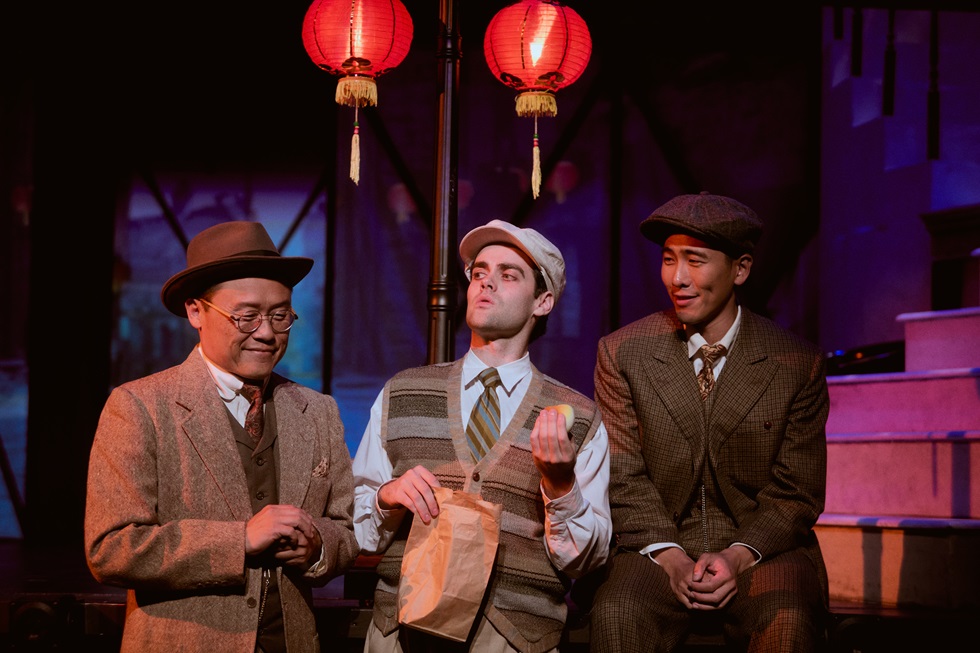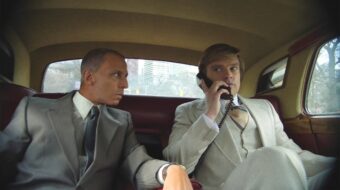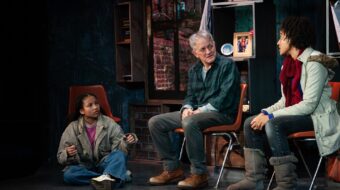
D.W. Griffith’s 1915 Civil War-era epic The Birth of a Nation dealt with Reconstruction, while Korean-American Philip W. Chung’s new world premiere play Unbroken Blossoms deals with the deconstruction of Asian imagery in another Griffith movie. Despite its positive public reception, the motion picture pioneer’s cinematic spectacle celebrating the Ku Klux Klan provoked scathing scorn and criticism. Unbroken opens with an angered Griffith (Arye Gross) quoting the denunciation of Birth by The New Republic’s critic, Francis Hackett, for being “aggressively vicious and defamatory…a spiritual assassination.” Later in Unbroken, apparently during a Birth screening, an inebriated, outraged Griffith excoriates Hackett’s review again, urinates at the screen, and grumbles that The New Republic should lick his piss up.
A century later, critics were still piling on. In 2015, during Birth’s centennial, I wrote in The Washington Post that Birth “is the most racist movie ever made.”
Griffith was so stung by the rebuke and calumny heaped upon him for directing his pro-Confederacy, pro-KKK three-hour-plus blockbuster that he reportedly resolved to make humanistic movies that would prove his detractors wrong. In 1916, D.W. plowed his profits from Birth into making the colossal Intolerance, a remarkable movie-palooza dramatizing “man’s inhumanity to man” throughout the ages.
In 1919 Griffith directed Broken Blossoms, a screen adaptation of Thomas Burke’s novel The Chink and the Child, which provided the main impetus that motivated Seoul-born P.W. Chung to write Unbroken Blossoms. It depicts D.W.’s making of what’s called, in Chung’s play, Hollywood’s first major movie about interracial love. At the reception following the premiere, Chung described Broken Blossoms to me as “problematic in its own way but pretty progressive for its time,” which seems like a fair assessment of the classic starring Lillian Gish (Alexandra Hellquist) and Richard Barthelmess (Conlan Ledwith), each in roles deemed high points of their careers.

Interestingly, presumably, as part of Griffith’s crusade to repair and rehabilitate his Birth-besmirched reputation, D.W. also hired two Chinese consultants in order to enhance Broken’s authenticity, Shanghai-born James Leong (Gavin Kawin Lee) and Guangdong-born Moon Kwan (Ron Song). In particular, Griffith tasked “the boys” with preparing the clueless Caucasian actor Barthelmess to realistically portray Broken’s lead male, Cheng Huan, in yellowface as “Asiatic.”
Tellingly, Unbroken’s Asian American playwright makes these two real-life figures, relatively lost to official Hollywood history (until now, thanks to Chung’s rediscovery of them), the protagonists of his thought-provoking drama. Unbroken depicts Leong and Kwan’s pioneering efforts to counter caricatures and anti-Asian hate, and to tell their own stories with their own voices and visions. In doing so, stage and screen stereotypes of “Oriental” actors and themes are brilliantly deconstructed and debunked by Chung and director Jeff Liu from an authentic pro-Asian perspective.
Unbroken Blossoms is steeped in La-La-Land lore, with film clips and other projected images cleverly rendered by projection designer Sam Clevenger. As a film historian, it was exciting and fascinating to see Griffith and Gish brought to life onstage. Owing to his dynamic, innovative use of cross-cutting, close ups, iris shots, and much more that were instrumental in the creation of cinematic syntax and language, Griffith was ballyhooed as the “Man Who Invented Hollywood.” Lillian Gish was widely considered to be the silent screen’s greatest actress, and “Miss Gish” was often D.W.’s leading lady. According to the play, for a period of time, this also applied offscreen as well. Their working and personal relationship is grist for the play’s mill and suggests that the much older director, who had an imperial streak full of self-importance and was addicted to the exercise of power and control, could be psychologically, if not physically, abusive to Lillian.
Unbroken Blossoms includes many fascinating tidbits about Hollywood history that even this film historian and former Cinema major, who studied Griffith at Manhattan’s Hunter College film school and at the Museum of Modern Art, never knew. For instance, I’d never heard that in 1935 there was a talkie remake of Broken Blossoms; or that James Leong went on to direct a feature film and act in up to 96 movies and TV shows; nor that Kwan had returned to China to import American films and to make dozens of his own films for the domestic market. Good on Chung for shedding light on all this and much more.
However, considering Unbroken’s high degree of historical accuracy, there are some obvious gaffes. Arye Gross delivers a fine performance as Griffith, but from the veracity viewpoint, it’s undercut by the actor’s goatee: In every photo I’ve ever seen of him, the director was always clean shaven, never ever had facial hair. Furthermore, Griffith was 43 when he and cameraman Billy Bitzer lensed Broken Blossoms, but Gross looks (and is) 20-plus years older than the helmer he depicts. Hence, from the historically correct—if not talent—perspective, Gross has been miscast.
Unbroken also has a parallel subplot that mirrors Broken Blossoms’ plot, as Leong romances a Caucasian woman, Gilda (also played by Alexandra Hellquist in a secondary role) with dire consequences. Some may consider this to be a bit of clever writing, while others may consider it to be too calculated for the playwright’s script.
But these are mere quibbles, as Unbroken Blossoms is an important new play and a must-see for theatergoers interested in: Hollywood history; the legacy of and harm perpetrated by stage/screen stereotypes and racism; in particular, the depiction of people of Asian ancestry; plus, the ongoing deconstruction of Asian imagery spearheaded by talents who are themselves Asians and Asian Americans. As the “self” seeks to tell its own story—rather than hear it from the dominant majority culture (of white America)—it’s important to enter into dialogue and conversation with the archetypes, tropes, caricatures, and characters that have been inflicted upon the “self” by the “other” (as a profit-making means of social control, often through humiliation that reinforces the supposed superiority of one group over “inferior” ethnic groups). Chung’s Unbroken joins Preston Choi’s likewise stellar This is Not a True Story, which tackled hackneyed Western cliches in Puccini’s Madame Butterfly and Broadway’s Miss Saigon, and is also a key milestone towards “self-determination” in the arts for Asian Americans. The issue of who controls the narrative is vital, nowadays more than ever.
It’s also noteworthy that Chung’s two-act play debuted June 30 in L.A.’s Little Tokyo district at East West Players. This venerable venue is one of America’s longest running theaters of color and the largest producer of Asian American productions since the company was co-founded in 1965 by Japanese-American actor Mako, who was Oscar-nominated for 1966’s The Sand Pebbles. Famed Star Trek thespian George Takei sat near the front row on opening night, which I believe was also attended by Bruce Lee’s daughter, Shannon Lee. In 2018 Takei led the cast of the musical Allegiance, which EWP co-presented. After Unbroken’s premiere, “Sulu” told me, “It’s great to see East West Players back in action again.”

For 45 years, the Directors Guild of America’s accolade to “honor distinguished achievement in motion picture direction” was called the D.W. Griffith Award. But in 1999 the DGA’s National Board unanimously voted to change the name of this coveted prize to The DGA Lifetime Achievement Award for Distinguished Achievement in Motion Picture Direction. There is no doubt that Griffith played an essential, incalculable role in the creation of the cinema as a distinct art form—arguably more than any other talent in film history. But having said that, the immeasurable, irreparable harm he caused with racist movies such as The Birth of a Nation—which is credited to have inspired a rebirth of the Klan, those despicable, dreaded domestic terrorists—far outstrips the good he did esthetically. For this reason, what the DGA did was well-deserved and righteous. And I believe P.W.’s play about D.W., written from the POV of a nonwhite person from Korea, not a Caucasian from Kentucky, bears this out.
Unbroken Blossoms is a highly entertaining, enlightening play that helps break the chain and yoke of racist narratives. Chung’s exceptionally well-written, insightful drama is another step forward toward deconstructing and replacing trite tropes and psychotic stereotypes with cultural authenticity and sensitivity, as the “self” tells its own story to its self—and to the white “others” who for far too long had imposed their misrepresentations upon the Asian “self.”
Unbroken Blossoms is performed on Fri., Sat., and Mon. at 8:00 p.m., with Sat. matinees at 2:00 p.m. and Sun. performances at 5:00 p.m., through July 21 at East West Players, David Henry Hwang Theater, 120 Judge John Aiso St., Los Angeles 90012. For tickets and info call (213) 625-7000 or go to the EWP website. Following the July 12 performance, a discussion is scheduled on “Early Asian Americans in Hollywood” with Paula Yoo, Diana Lee Inosanto, and Arthur Dong, moderated by author and EWP board member, Jeff Yang.
We hope you appreciated this article. At People’s World, we believe news and information should be free and accessible to all, but we need your help. Our journalism is free of corporate influence and paywalls because we are totally reader-supported. Only you, our readers and supporters, make this possible. If you enjoy reading People’s World and the stories we bring you, please support our work by donating or becoming a monthly sustainer today. Thank you!












Comments